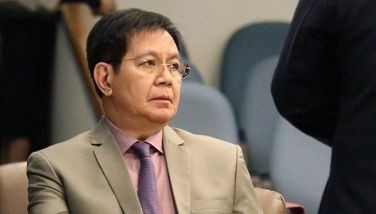Should the VFA be reviewed?
January 13, 2007 | 12:00am
 The easy answer is that it should! Our review of regional trial court and appellate court pronouncements regarding the custody of US Marines Lance Corporal Daniel Smith has made a couple of things clear.
The easy answer is that it should! Our review of regional trial court and appellate court pronouncements regarding the custody of US Marines Lance Corporal Daniel Smith has made a couple of things clear.
One, Article V of the Visiting Forces Agreement on criminal jurisdiction does not provide clear answers to such mundane questions as which government, the Philippine or US, is entitled to custody of a US soldier who is convicted by a Philippine trial court and is awaiting the outcome of his appeal of that conviction.
Two, the VFA’s failure to clearly provide for solutions to routine procedural questions such as this is dangerous. This ambiguity provides the impetus for the parties to engage in needless diplomatic face-offs whenever these questions come up.
That’s because each party to the VFA can be expected to assert whatever posture best protects its perceived national interest. For instance, the US can be expected to insist on the "human rights" of an accused or convicted American soldier.
America has certain standards in the treatment of accused persons before and during trial, and in the event he is sentenced to a prison term. While Smith may have been accorded all his rights to due process and a fair trial, the prison system in this country arguably falls far short of US standards on the humane treatment of criminals convicted of petty, as well as capital, crimes.
The Philippines, on the other hand, will certainly defend the honor of Filipino manhood or womanhood, national sovereignty and the integrity of our justice system. But whether we belong to the punitive or the rehabilitative school of treating prisoners, we have to admit that our prisons are virtual hell-holes where any notions of human dignity must take a back seat to the imperatives of sheer survival.
In saying this, we do not mean to condemn any particular government administration. All have claimed a persistent lack of funds to implement needed prison reforms, or implement those reforms quickly enough. Still, at the end of the day, our jails cannot be said to measure up to our own, much less international, standards.
Of course, the victims of crimes committed by American soldiers don’t care one whit about the treatment of these soldiers whose crimes, under the VFA, clearly fall under the jurisdiction of the local courts.
Why, the argument goes, should these soldiers be treated differently from Filipinos accused and found guilty of such heinous crimes as rape? Victims and supportive advocacy groups insist that US soldiers should suffer the consequences of crimes they commit here, just like any Filipino criminal. You want to avoid Filipino jails? Then, behave or you will become some macho jail mayor’s fair-skinned "girlfriend."
The exercise then usually deteriorates to each State party hectoring each other about violating treaty obligations. In addition, the tendency is to publicly rattle sabers or covertly make threats of varying seriousness, of a political and/or economic nature.
Is this any way for a VFA to work? Of course not! The very idea of a concluded VFA is to avoid new negotiations when fully anticipated questions come up.
Smith is not the first US soldier accused of raping a Filipina. This country’s had plenty of experience with US soldiers charged with crimes under the defunct Bases Agreement. That experience should have convinced VFA negotiators of the necessity of being crystal clear on the handling of criminal cases arising under the VFA.
But crystal clear, said the Court of Appeals, was definitely NOT what the VFA was on the custody of a convicted US soldier. Although both the Court of Appeals and the Makati court read Sections 6 and 10, Art. V, of the VFA the same way, the ultimate result, the continued custody of Smith by the US Embassy, wasn’t quite what was expected by those who thought Smith was headed right back to the Makati city jail.
Yet, there is obvious reluctance on the part of Manila and Washington, D.C. to remove ambiguities in Article V of the VFA on the matter of custody.
We have suggested a possible reason: the Agreement between Foreign Affairs Secretary Bert Romulo and US Ambassador Kristie Kenney. That agreement, as we’ve seen, specified the building and the size of the room in which Smith would be held.
More importantly, it seemed to give Philippine authorities unimpeded access to the specific place of Smith’s detention, to ensure compliance by the US with the VFA.
Does the treatment of Smith pursuant to the Romulo-Kenney agreement provide a workable model for handling similar cases in the future? If you believe that the full access given the Philippines to check on Smith, while he remains in detention at the US Embassy, reflects the intent of the VFA, I guess you would say yes.
But if you think that the Romulo-Kenney agreement screams "special treatment" in your ear, then I suppose you would insist that this is no way to handle a criminal convicted by a trial court of rape.
There is also this hypothetical question: Where will Smith be detained if, I stress if, his conviction is upheld by the Supreme Court? The assumption is that he will be turned over to Philippine authorities to start serving his sentence at our national penitentiary in Muntinlupa. But read the VFA again. It doesn’t really require this.
In such a case, evidently, we would be back to Section 10, Article V. This suggests that the Romulo-Kenney agreement would apply too. If so, Smith would stay at the US Embassy for life!
And since what’s for good for Smith must be good for his fellow American soldiers, his colleagues who are convicted by a Philippine court pursuant to Article V of the VFA would likewise stay at the Embassy and never see the inside of a Philippine jail.
If this was the intention of the VFA, then the Filipino people should know that. If not, we should know that too.
This VFA very much needs a "review," if only to clarify these ambiguities in Article V, principally Sections 6 and 10 thereof. If neither government wants a renegotiation of various provisions, or a thoroughgoing review of the basic concepts behind a Visiting Forces or Status of Forces agreement, then so be it.
Opponents of any presence of the US military in the country are obviously itching to renew the debate over basics. But if the Executive’s judgment, in light of all the information available to it, is that it would be contrary to public interest to revisit the fundamentals, then the government cannot be legally forced into such a review.
But the government knows, I’m sure, that it is accountable to the people for that decision, as well as for its appreciation of where the national interest truly lies.
BrandSpace Articles
<
>
- Latest
- Trending
Trending
Latest
Trending
Recommended





























